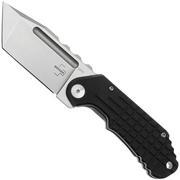

You have an outdated webbrowser. The website might not work correctly.
The frame lock, originally developed by Chris Reeve and known as the Reeve Integral Lock (RIL), is a commonly used locking mechanism for pocket knives. The frame lock is very similar to the liner lock, but offers extra strength in that a milled-out part of the handle itself falls behind the hinged blade to lock it in place. Instead of the thin liner of a liner lock, the frame lock ensures you benefit from the robustness of the handle itself. In addition, your hand provides the lock with additional strength. As your hand squeezes the handle, you pinch the frame lock closed. As a result, inadvertent unlocking will hardly ever occur.
The material of the frame lock is crucial for durability and reliability. For example, aluminium frame locks are often fitted with a steel end to prevent wear, as steel is more resistant to the constant friction. In practice, you see that titanium and steel are the most popular choices for a frame lock. The accuracy with which the frame lock closes on the blade is also important and determines the strength of the lock.
Like a liner lock, a frame lock is easy to operate with one hand. However, caution is needed when closing the blade, as your fingers will get pretty close to the sharp edge. Despite this risk, the frame lock remains popular because of its robust construction and the reliability it offers.
In knives with a frame lock or liner lock a detent ball is crucial for the locking mechanism. The detent ball is a small ball bearing made from steel or ceramics. In knives with a frame lock or liner lock a detent ball will make sure that when closed the knife won't accidentally open. As the detent ball falls into the hole when the knife is closed, the knife will stay closed.